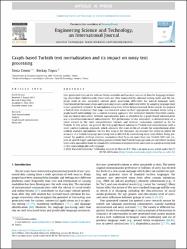Please use this identifier to cite or link to this item:
https://hdl.handle.net/20.500.11779/1794| Title: | Graph-Based Turkish Text Normalization and Its Impact on Noisy Text Processing |
| Authors: | Topçu, Berkay Demir, Şeniz |
| Keywords: | Noisy text Graph-based representation Turkish Text normalization |
| Publisher: | Elsevier |
| Source: | Demir, S., & Topcu, B. (June 2022). Graph-based Turkish text normalization and its impact on noisy text processing. Engineering Science and Technology, an International Journal. pp.1-13. https://doi.org/10.1016/j.jestch.2022.101192 |
| Abstract: | User generated texts on the web are freely-available and lucrative sources of data for language technology researchers. Unfortunately, these texts are often dominated by informal writing styles and the language used in user generated content poses processing difficulties for natural language tools. Experienced performance drops and processing issues can be addressed either by adapting language tools to user generated content or by normalizing noisy texts before being processed. In this article, we propose a Turkish text normalizer that maps non-standard words to their appropriate standard forms using a graph-based methodology and a context-tailoring approach. Our normalizer benefits from both contextual and lexical similarities between normalization pairs as identified by a graph-based subnormalizer and a transformation-based subnormalizer. The performance of our normalizer is demonstrated on a tweet dataset in the most comprehensive intrinsic and extrinsic evaluations reported so far for Turkish. In this article, we present the first graph-based solution to Turkish text normalization with a novel context-tailoring approach, which advances the state-of-the-art results by outperforming other publicly available normalizers. For the first time in the literature, we measure the extent to which the accuracy of a Turkish language processing tool is affected by normalizing noisy texts before being processed. An analysis of these extrinsic evaluations that focus on more than one Turkish NLP task (i.e., part-of-speech tagger and dependency parser) reveals that Turkish language tools are not robust to noisy texts and a normalizer leads to remarkable performance improvements once used as a preprocessing tool in this morphologically-rich language. |
| URI: | https://doi.org/10.1016/j.jestch.2022.101192 https://hdl.handle.net/20.500.11779/1794 |
| ISSN: | 2215-0986 |
| Appears in Collections: | Bilgisayar Mühendisliği Bölümü Koleksiyonu Scopus İndeksli Yayınlar Koleksiyonu / Scopus Indexed Publications Collection WoS İndeksli Yayınlar Koleksiyonu / WoS Indexed Publications Collection |
Files in This Item:
| File | Description | Size | Format | |
|---|---|---|---|---|
| 1-s2.0-S221509862200101X-main.pdf | Full Text - Article | 1.06 MB | Adobe PDF |  View/Open |
CORE Recommender
Sorry the service is unavailable at the moment. Please try again later.
Items in GCRIS Repository are protected by copyright, with all rights reserved, unless otherwise indicated.